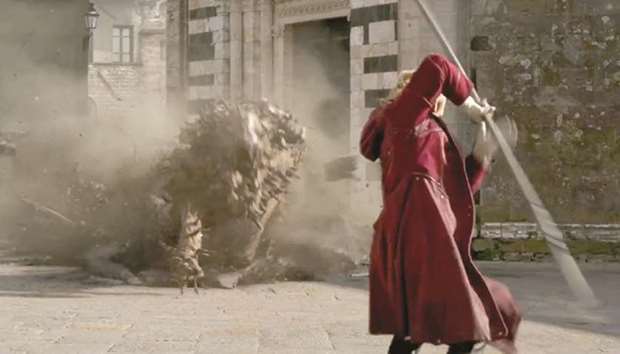“I thought it is appropriate to present to the world a comic book and VFX-based work that represents the current trend in Japanese cinema,” Festival Director Takeo Hisamatsu said. “Even if the budget is not comparable to a Hollywood production, you will be surprised at its quality.”
The last time Tokyo kicked off with a Japanese movie was 10 years ago, during its 20th edition. The film was Midnight Eagle, and the year was 2007.
While Fullmetal Alchemist transforms a highly popular comic series (and Japan is very well known for its Manga comics) into live action, tracing the journey of two brothers as they decide to regain all that they have lost, the Festival’s closing work, An Inconvenient Sequel: Truth to Power will document how close we are to a real energy revolution. It has on its cast Al Gore, the American politician and environmentalist who served as the US Vice-President from 1993 to 2001. Al Gore will attend the screening.
Between the opening and closing nights, Tokyo will showcase movies, which will be – in the words of Hisamatsu –“expansive, empowering and enlightening”. The programme will offer a wide mix of genres, which will include dramas, thrillers and romantic comedies with a riveting international competition that will be judged by a panel, headed by the popular American actor-director Tommy Lee Jones.
The competition will have eight world premieres. Here are some: Zhanna Issabayeva’s Sveta, about a woman with a hearing disability fighting to survive; Takahisa Zeze’s The Lowlife, focusing on the personal struggles of female adult-video performers; Margarethe von Trotta’s Forget About Nick, which talks about a model turning into a designer and being forced to live with her husband’s ex-wife when he disappears; Asghar Yousefinejad’s The Home, tracing the travails of a woman who returns to her family home after a long absence when her father dies; Govinda Van Maele’s Gutland, an erotic thriller about a village drifter and; Dong Yue’s The Looming Storm, which follows a factory guard as he begins to fancy himself as a detective trying to probe a murder.
Apart from competition, the Festival will have several sections like Crosscut Asia, Japanese Cinema Splash, World Focus and Japan Now. And then there will be The World of Steven Soderbergh – who will be in attendance with three of his own titles: Sex, Lies and Videotape (1989), Ocean’s Eleven (2001) and Haywire (2011).
Some delightful masterclasses have been planned and will include top arthouse names from the region like the 2017 Samurai Award winner, Ryuichi Sakamoto, The Philippines’ Brillante Mendoza, Japan’s Fumihiko Sori and Cannes favourite Naomi Kawase.
***
Bengali cinema
Bengali cinema has been floundering for a long time. Since the heyday of Satyajit Ray, Ritwik Ghatak and Mrinal Sen, Bengali films have been dipping the scales. And for the past decade or so, with Ray and Ghatak gone, and with Sen too old and too ill to step behind the camera, Bengali movies have degenerated beyond recognition. One of their biggest follies was to ape Bollywood in their desperation to win over the younger generation. The result was nothing short of disaster, with Bollywood style hungama destroying a cinema known for its finer art of storytelling and subtle style of acting.
It is a matter of sorrow now that except for directors like Buddhadeb Dasgupta and Aparna Sen, and with the promising Rituparno Ghosh gone in 2013 when he was just 50, Bengal has very little talent to talk about. Yes, we have an Aditya Vikram Sengupta, whose dialogue-less first black-and-white effort, Labour of Love, held immense potential. But he is just starting.
It is in a scenario such as this that auteurs like Dasgupta and Sen – both in their seventies – still matter in Bengal, and are still looked upon to deliver something meaningful in the tsunami of trash.
Dasgupta’s latest, Urojahaj, is all set to go on the floors anytime now. He said that it would be his own story and about the dreams of a person who wished to revolt against a system which wanted to shackle him. An apt plot for the times we now live in.
Dasgupta’s cinema journey began almost four decades ago in 1978 when he made Dooratwa (about the life of a young college professor whose inter-personal skills are poor), and it was a journey which saw the helmer create some of the most fantastic films that ranged from Bagh Bahadur to Kalpurush to Charachar. All of them invariably tackle the angst and agony of the common man. Often, Dasgupta’s movies reflect the suffering of the rural masses, their big dreams but modest ambitions.
A poet and novelist, it is only natural that Dasgupta’s works are lyrical. We see music and melody and poetry in his frames, and they are leisurely paced as if they are set in a time long gone by. But make no mistake, the storylines are powerfully contemporary.
Sen has fascinated me with four of her films – among the several she has made. If my all-time favourite remains 36 Chowringhee Lane (with a brilliant performance by Jennifer Kendal who as an ageing Anglo-Indian teacher in Kolkata faces hurt, humiliation and loneliness pictured most poignantly on one Christmas night), I quite liked Paroma (about a woman’s self-realisation towards an identity independent of her status as a wife or daughter-in-law or aunt), Mr and Mrs Iyer (a great take on Hindu-Muslim unity narrated through the travails of a Tamil Brahmin woman who goes through a nightmarish bus journey) and Goynar Baksho ( a hilarious take on three women from three different generations and how they assert themselves in society and its changes).
* Gautaman Bhaskaran is covering the 30th edition of the Tokyo International Film Festival, and may be e-mailed at [email protected]

